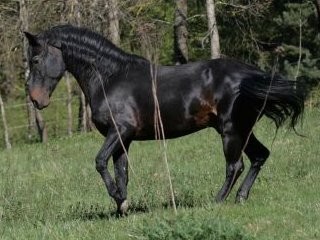Kabarda Horse
A species of Equus caballus Scientific name : Kabarda Horse Species : Equus caballus
Kabarda Horse, A species of Equus caballus
Scientific name: Kabarda Horse
Species: Equus caballus
Content
Description General Info
 Photo By Klara , used under CC-BY-SA-3.0 /Cropped and compressed from original
Photo By Klara , used under CC-BY-SA-3.0 /Cropped and compressed from original Description
The kabarda Horse breed has a distinctive place in the equestrian world, revered for its stamina and adaptability, traits honed through centuries of survival in harsh, mountainous terrains. Steeped in a rich history dating back to the 16th century, its origins can be traced to the Northern Caucasus region of Russia. The breed's impressive power-to-weight ratio makes it a superior choice for endurance riding, providing an intriguing intersection of historical adaptation and modern utility.
Care Level
Easy to moderate
General Info
Origin
Russia
Lifespan
20-30 years
Characteristic:UsageDescription
Riding, endurance, dressage, jumping, racing
Temperament
Hardy, intelligent, calm, responsive, resilient
Diet
Hay, grass, grains
AdultSize
14-15 hands
Appearance
The quintessential kabarda Horse flaunts a dense, shiny coat predominantly of bay, gray, chestnut, and rarely black or dun. Markings are infrequent, but faint stars, strips, or snips on the face can be observed. Standing 14.2-16 hands high, kabarda Horse showcases a robust, sturdy body with a broad chest, muscular neck, and strong back. The mane, dense yet short, often mirrors the coat color, and the tail is thick and long. This breed's eyes are generally dark brown, which tend to lighten slightly with age. Kabarda Horse's straight, so-called 'oriental' head sets them apart, with their expressive, slightly almond shaped eyes, broad forehead, and refined, chiselled muzzle.
Behavior
Kabarda Horse are characteristically calm, intelligent, and hardy, exhibiting exceptional adaptability to challenging environments. They show a high degree of learnability and tend to respond well to training, making them reliable mounts. Despite their apparent stoicism, they can exhibit sensitivity to their handler's cues. Socially, they are attuned to group dynamics, exhibiting cooperative behavior in herd settings.
Scientific Classification
Phylum
Chordates Class
Mammals Order
Odd-toed hoofed mammals Family
Horse family Genus
Asses and zebras Species
Equus caballus Breed
Kabarda Horse